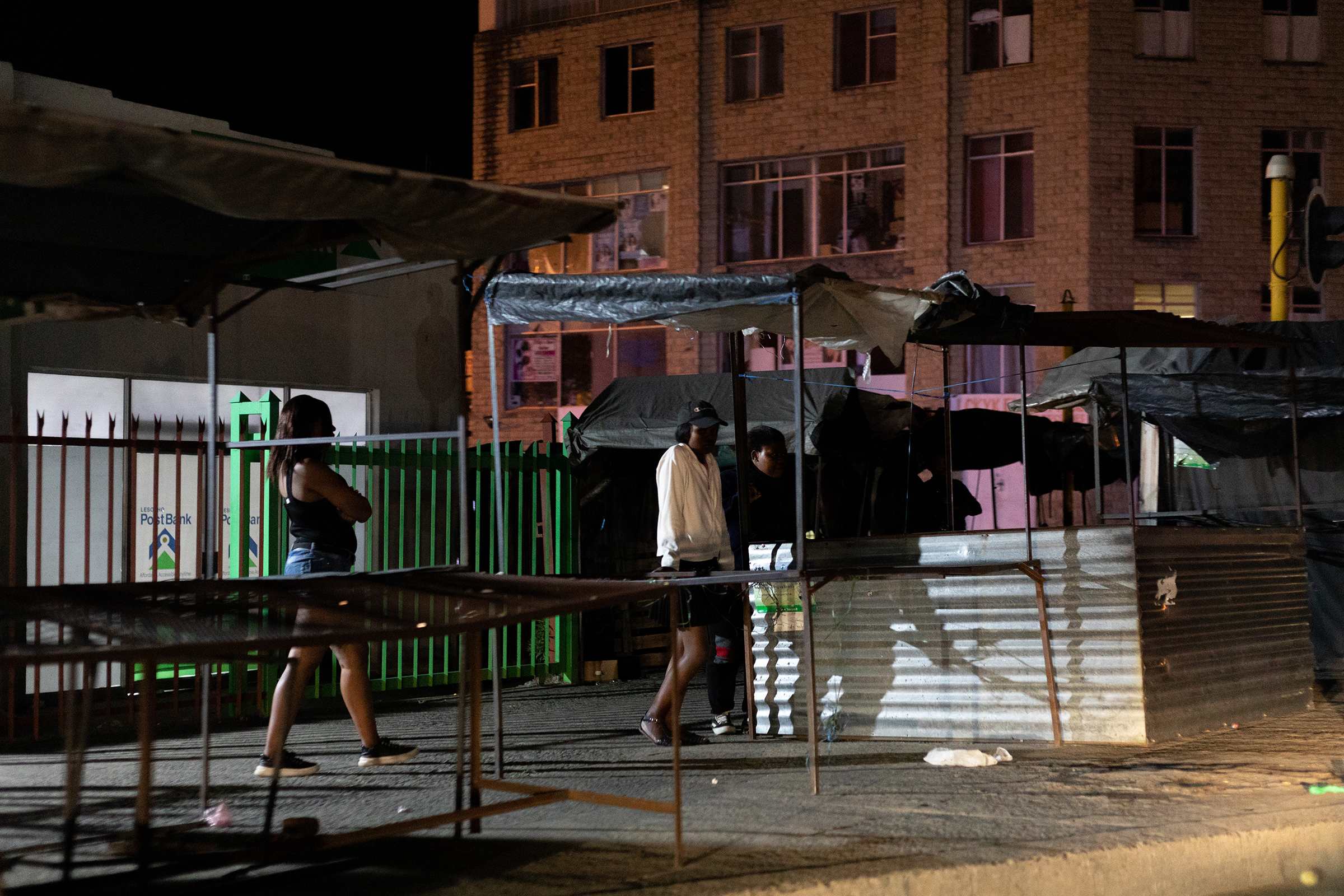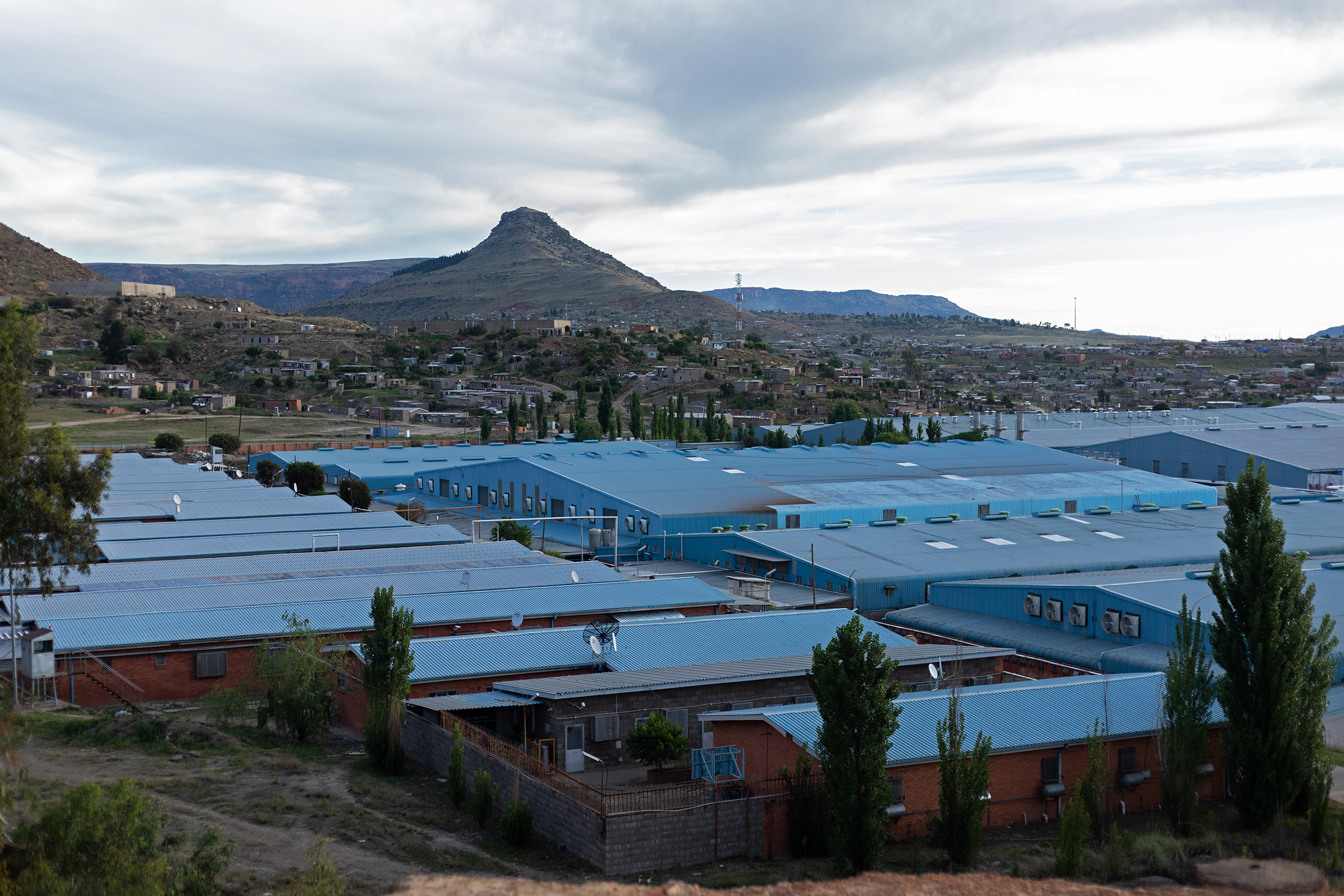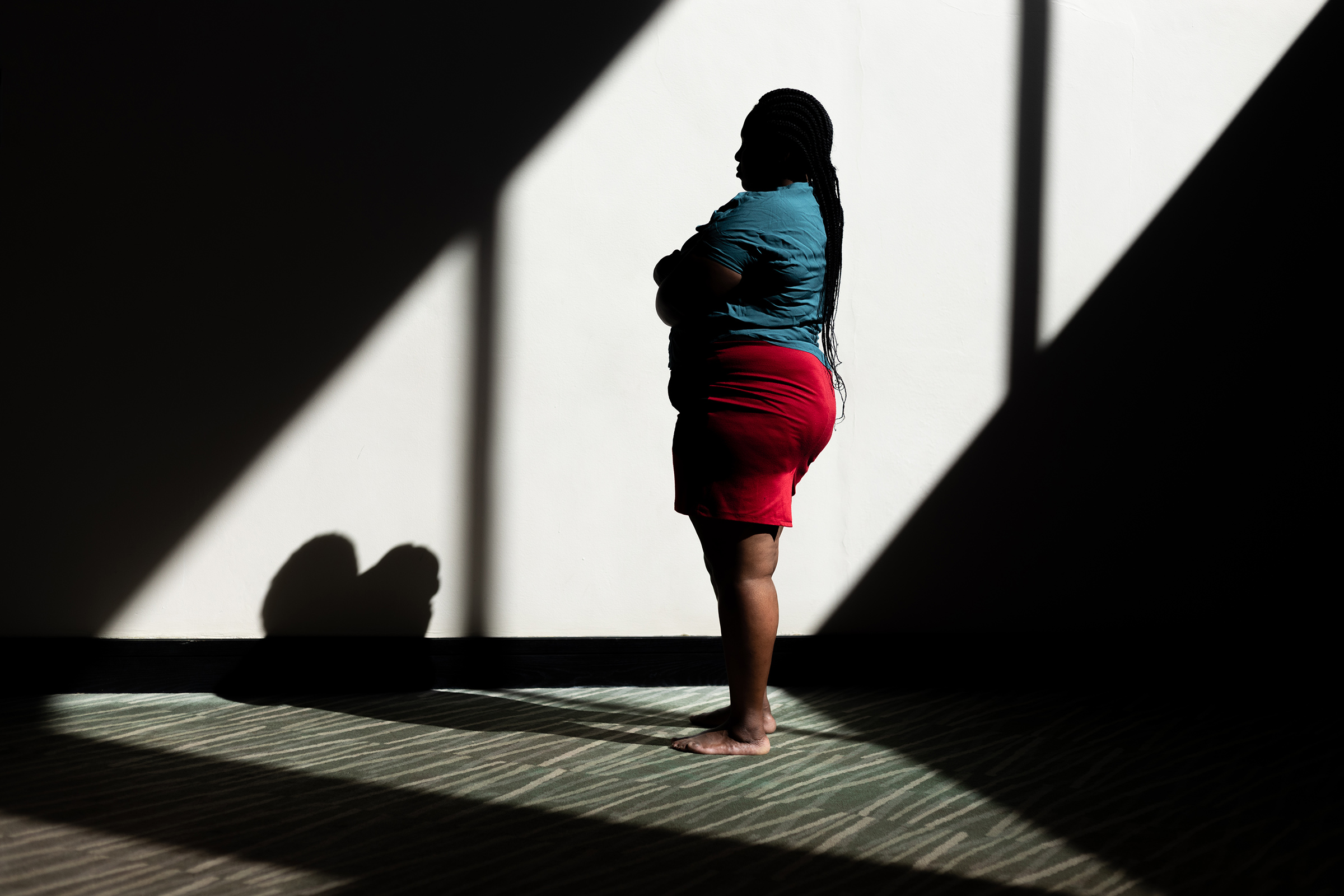This piece is published in partnership with The Fuller Project.
After Anna tucks her five children into bed each weeknight, she walks out the door to a grass patch behind her home. The former seamstress searches for the flat, heavy stone under which she’s buried her uniform for tonight: a camouflage miniskirt.
For five years, the 30-year-old mother stitched Levi’s jeans at a garment factory in Lesotho, a small landlocked country within South Africa. The salary wasn’t much; she occasionally had sex with a male colleague for an extra $20 a month to support her family. But as the garment industry, one of the country’s largest employers, crumbled during the coronavirus pandemic, she found herself on the end of mass layoffs. In April of this year, management announced that the factory would be closing, due to reduced orders from U.S. brands and other pandemic-related issues. She was let go in August.
A week later, she turned to sex work full time.
“I don’t want my husband to know, so I leave home dressed normally, and then I change into a short skirt that shows my thighs,” she says. “My children don’t have clothes; I don’t have food. I have to do this.”
Anna, who asked to be identified by her middle name only for safety reasons, is one of over 6,000 garment workers who recently lost a job with the Nien Hsing group. The Taiwanese company—Lesotho’s largest garment sector employer—owns five major factories, three of which have closed in the past 16 months. Nien Hsing has been a major supplier to Levi’s, Kontoor Brands (owners of Wrangler) and the Children’s Place, but the company has reduced production amid COVID-19 pandemic headwinds.


In a country whose faltering economy relies heavily on the garment sector, the U.S. is the largest recipient of Lesotho’s clothing exports. A mostly female workforce—roughly 90% are women—once stitched denim for some of America’s most famous brands. Many are single parents and their families’ main breadwinners.
Globally, garment workers like Anna face continued pandemic-era fallouts from disrupted financial markets, upended supply chains and clogged ports. As the virus kept consumers at home and shuttered shops, people bought less, and Western fashion brands canceled or delayed billions of dollars’ worth of orders.
At garment factories around the world, staffers, the majority of whom, like Nien Hsien’s staff, are female, were laid off or sent home without pay. Since the start of the pandemic, some 1.6 million garment workers have lost their jobs in seven Asian countries, including Bangladesh, India and Myanmar, according to the Clean Clothes Campaign.
After plunging to historic lows last year, U.S. clothing sales have since hit record highs. Apparel stores took the biggest hit, with a 78% drop in April 2020, according to the U.S. Commerce Department. Eighteen months later, October sales at clothing and accessory stores were up 25.8% from the same point in 2020.
More from TIME
Retail markets may have begun to bounce back, but for already low-paid and vulnerable workers in factories in Lesotho and larger garment-producing countries such as India and Cambodia, those gains can take time to trickle down. Ongoing disruptions continue to cause havoc in a period when retailers remain uncertain about the future. With few alternatives, women already working in an already unstable industry face abject poverty, spiraling debt and scant job prospects, industry experts say.
“The clothing supply chain is run on a knife edge,” says Neil Saunders, managing director at research firm GlobalData Retail. “Margins are so thin because of this continual pattern of deflation and consumers wanting to pay less in Western markets. There’s just no room for error. You can’t say, ‘We’ll take a hit, it’ll be fine.’”
In India, there is still a “great deal” of uncertainty about orders in Chennai, an industrial hub on the southeastern coast, says Sujata Mody, president of the Garment and Fashion Workers Union. She estimates that 10% of the multibillion-dollar industry’s approximately 200,000 workforce in Chennai are still unemployed. Many factories remain closed, she adds, while those still working face longer hours, higher expected targets and increased incidents of violence.

India makes up about 16% of textile imports to the U.S. and about 5% of apparel and accessories, according to an analysis of U.S. International Trade Commission data by the Peterson Institute for International Economics.
“The women who work in these industries are very marginalized. They are dependent on their incomes and really vulnerable. And so nobody really bothers about them,” says Mody. “These women are not just invisible—it’s like they don’t exist.”
Female garment workers over 40 have been hit particularly hard, she adds. Viewed as less productive, they were targeted when factory owners downsized during the pandemic, says Mody, who has spoken to hundreds of women who reached out to the union. Some have been able to find temporary low-paid cleaning work, while others are struggling to find anything at all, she says.
For Sam Phary, a 40-year-old garment worker in Cambodia, her soaring debts are keeping her awake at night. A single parent to three children, she owes $10,000 to a microfinance lender. As COVID-19 infections rose in mid-April of this year, Cambodia once again shut clothing factories, leaving thousands of workers without income. While she was unemployed, Phary borrowed money from relatives to make her monthly $350 payments. She is back sewing at a factory in Phnom Penh, the capital, but earns less due to reduced orders, she says, and is concerned she’ll lose her home if she continues to default on her repayments.
Last year, Cambodia’s $7 billion garment sector, the country’s largest employer with roughly one million (mostly female) workers, was dealt a double blow by the pandemic and by European Union tariffs imposed over human rights abuses. By mid-May of this year, an estimated 102 garment factories in Cambodia had permanently closed, said Heng Sok, Secretary of State of Industry, Science and Innovation, in an interview with local media. Nearly three-quarters went bankrupt because of a lack of orders or suspensions, he added.
Lesotho’s garment industry has also long been ravaged with problems. In May, TIME and the Fuller Project reported on vast sexual abuse and harassment taking place at Hippo Knitting, another Taiwanese company in Lesotho’s capital, Maseru. The factory predominantly supplied one brand, Fabletics, a popular U.S. athletic apparel line co-founded by actor Kate Hudson. After a three-month pause, the brand resumed production in August while taking steps to improve workers’ rights.
But roughly 600 workers are reportedly expected to be permanently laid off early next year, according to Sam Mokhele, general secretary of the National Clothing, Textile & Allied Workers’ Union in Lesotho. When asked about a reduction in orders at Hippo Knitting, Fabletics said in an emailed statement that orders over the last few months have been greater than or equal to those placed last year. The factory owners declined to comment on looming job cuts.

“The workers are free of harassment,” says one seamstress who asked to remain anonymous due to job security concerns. “But we’ve already gone on Christmas break, and we don’t know what’s going to happen when we come back. Our jobs are hanging in the balance.”
Less than four miles away, thousands of women from the Nien Hsing factories already face this stark reality. In a matter of months, the company’s estimated 10,000-strong workforce dropped by more than half and lost over $50 million this past year, according to Louis Rouillon, Nien Hsing’s former social responsibility director.
He says that in addition to Wrangler and the Children’s Place cutting orders by roughly 30% this year, rising transport costs, recent wage protests in Lesotho and fluctuating Covid infection rates have all played roles in the company’s decline.
In an emailed statement, a spokesperson for the Children’s Place said Nien Hsing informed the retailer earlier this year that it was “scaling back operations,” and that the terms of their relationship “did not fit” the Taiwanese company’s new business model.
Levi’s said the brand had maintained—and at times increased—its order volume with the Nien Hsing group over the past year.Wrangler did not respond to multiple requests for comment.
Each month at the factory, Anna was paid less than the price of two pairs of Levi’s—about $133—but it wasn’t enough to cover her family’s basic costs, she says. No one at the factory knew about her arrangement with her male colleague, she adds. When he was let go, her monthly income dropped. Now, sex work nets Anna roughly $6 to $19 per night. Her family thinks she has found a cleaning job. She’s vague on the details, but worries that her husband has suspicions.
“My husband is quite thin,” she explains. “Maybe he’s not gaining weight because he’s harboring all these emotions. When he confronts me about his suspicions, I sometimes leave the house, go to the outside toilet and cry. It’s really painful for me, seeing my husband like that.”
Given the company’s three-decade history in Lesotho, Ricky Chang, Nien Hsing’s administration manager, says he remains hopeful some factories will reopen next year. “But it’s hard to tell,” he said. “Look at what just happened in South Africa [with the Omicron variant]—people are in panic again … If the environment does not allow you to stay, you have to seek something else. Right now, I am concerned about the entire future of Lesotho’s garment industry.”
Anna, meanwhile, has spent five months looking for customers in the dark—five months of feeling in constant danger, she says. Asked what he would like to say to women in her position, Rouillon doesn’t know quite how to answer. “It breaks my heart,” he says.
At 4 a.m., Anna jumps into a taxi to return home. The work she does now takes a toll, she says. She gave birth earlier this year. Several months ago, her cesarean wound became so painful she needed to rest for two weeks to recover.
“I couldn’t believe it was me doing that,” Anna recalls of her first night of sex work, her voice soft. “I have dreams.”
Once home, she slips back into her jeans. She carefully replaces the miniskirt under the flat, heavy stone, ready for tomorrow night.
With additional reporting by Sineat Yon in Cambodia
More Must-Reads from TIME
- Cybersecurity Experts Are Sounding the Alarm on DOGE
- Meet the 2025 Women of the Year
- The Harsh Truth About Disability Inclusion
- Why Do More Young Adults Have Cancer?
- Colman Domingo Leads With Radical Love
- How to Get Better at Doing Things Alone
- Michelle Zauner Stares Down the Darkness
Contact us at letters@time.com
